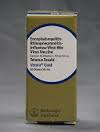
Principles of Vaccination
A “standard” vaccination program for all horses does not exist. Each individual situation requires evaluation based on the following criteria:
- Risk of disease (anticipated exposure, environmental factors, geographic factors, age, breed, use, and sex of the horse)
- Consequences of the disease (morbidity/mortality, zoonotic potential)
- Anticipated effectiveness of the selected product(s)
- Potential for adverse reactions to a vaccine(s)
- Cost of immunization (time, labor and vaccine costs) vs. potential cost of disease (time out of competition; impact of movement restrictions imposed in order to control an outbreak of contagious disease; labor and medication if, or when, horses develop clinical disease and require treatment, or loss of life.)
Note: The use of antibody titers or other immunological measurements to determine if booster vaccination is warranted is not currently practiced in the horse, as standardized tests and protective levels of immunity have not been defined in most cases. A correlation between antibody levels and protective immunity under field conditions has not yet been identified.
Clients should have realistic expectations and understand that:
- Vaccination alone, in the absence of good management practices directed at infection control, is not sufficient for the prevention of infectious disease.
- Vaccination serves to minimize the risks of infection but cannot prevent disease in all circumstances.
- The primary series of vaccines and booster doses should be appropriately administered prior to likely exposure.
- Each horse in a population is not protected to an equal degree nor for an equal duration following vaccination.
- Protection is not immediately afforded the patient after administration of a vaccine that is designed to induce active immunity. In most instances, a priming series of multiple doses of a vaccine must be administered initially for that vaccine to induce protective active immunity.
- All horses in a herd should be vaccinated at intervals based on the professional opinion of the attending veterinarian.
- A properly administered, licensed product should not be assumed to provide complete protection during any given field epidemic.
- Although rare, there is potential for adverse reactions despite appropriate handling and administration of vaccines.
